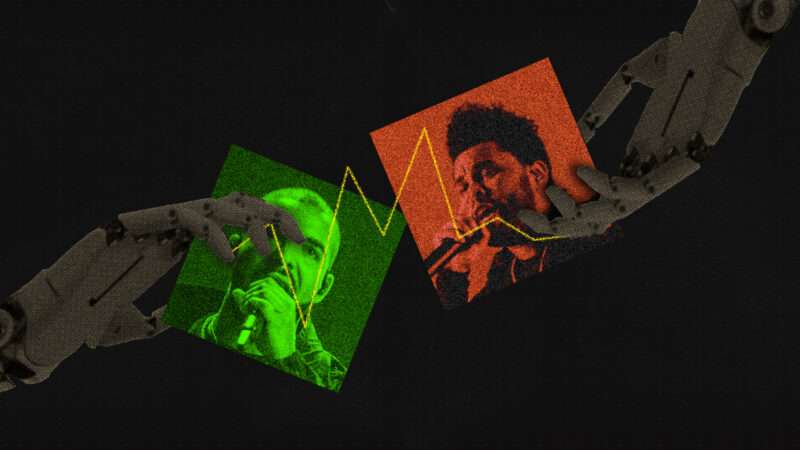
A viral song this month showed one of the potential uses—and a future battleground—in the realm of artificial intelligence (A.I.). On April 4, an anonymous internet user named ghostwriter977 uploaded a song titled "heart on my sleeve" to all the major streaming platforms, including Spotify, YouTube, and TikTok. The song sounds like a collaboration between pop superstars Drake and The Weeknd, but neither is on the track: ghostwriter977 used A.I. to simulate the artists' voices.
Generative A.I. analyzes existing pictures, video, text, or audio, and uses the patterns it finds to create new media. So if a user asks a generative A.I. platform for a song in the style of Drake, it can analyze the artist's existing lyrics and recordings of his voice to generate an impersonation of a Drake song. So far, it's unknown what software or platform ghostwriter977 used, nor whether they used A.I. to create the entire song or just the vocals.
Reactions from within the music industry have been mixed: In response to an earlier example of an A.I. faking his voice, Drake posted on Instagram, "This [is] the final straw AI." Meanwhile, electropop musician Grimes tweeted, "I'll split 50% royalties on any successful AI generated song that uses my voice. Same deal as I would with any artist i collab with. Feel free to use my voice without penalty." She added, "I think it's cool to be fused [with] a machine and I like the idea of open sourcing all art and killing copyright."
I think it's cool to be fused w a machine and I like the idea of open sourcing all art and killing copyright
— ???????????????????????? (@Grimezsz) April 24, 2023
"heart on my sleeve" is not completely convincing. The vocals sound processed and the music sounds cheap and tinny.
But Universal Music Group (UMG) found it convincing enough to have the A.I.-generated track pulled from most major platforms. The original YouTube link now says the song was pulled "due to a copyright claim by Universal Music Group." A UMG spokesperson told the BBC that "the training of generative AI using our artists' music…represents both a breach of our agreements and a violation of copyright law" and "demonstrate[s] why platforms have a fundamental legal and ethical responsibility to prevent the use of their services in ways that harm artists."
But it's not clear whether the song actually violates copyright law. "Right now, everybody's struggling with how to think about that question," Chris Mammen, an attorney and expert on intellectual property law, told VICE. "Because it's not literally a recording. We have a precedent for impressionists, who can go out there and make a living sounding just like celebrities. That's not a violation of anything. This is something in-between. Is there anything wrong with it? And if so, what exactly?"
For example, companies typically use YouTube's Content ID system to take down copyrighted material automatically. But as The Verge reported, UMG has been unable to use Content ID for the fake Drake song because it doesn't own the copyright. It's also unclear whether ghostwriter977 could even hold the copyright: According to the U.S. Copyright Office, only "the human-authored aspects" of an A.I.-generated work are copyrightable. Music and entertainment lawyer Kurt Dahl tells Reason that "the critical issue is what amount of human creative input or intervention will suffice to make AI-generated musical works copyrightable."
Instead, UMG has issued notices for individual uploads because the song contains an audio tag often featured on songs produced by hip-hop producer Metro Boomin. Since Metro Boomin did not produce "heart on my sleeve," UMG has claimed (so far successfully) that the inclusion of the tag constitutes copyright infringement.
But what if ghostwriter977 decided to re-upload the song without the producer tag? Mammen told VICE that any potential claim would then come down to a couple of other considerations, like Drake's and The Weeknd's "right of publicity"—the rights of celebrities to control their likeness.
Mammen said a claim could also stem from whether "Drake's body of copyrighted work [was] used to train the AI." The law has yet to weigh in on the use of copyrighted material to train an A.I. Getty Images is currently suing Stability AI, claiming that it improperly used millions of Getty's photos without a license to train its Stable Diffusion image generator.
Software giant Adobe is "developing a compensation model" for contributors whose photos are used to train the company's generative A.I. program Adobe Firefly. But it should be clear by now that there's no going back: As Reason's Ronald Bailey recently wrote, federal attempts to regulate A.I. are more likely to "slow progress way down, deny consumers substantial benefits, and make sure that only Big Tech wins, all while not increasing safety or lowering risks." And a moratorium on A.I. development "would certainly delay access to the possibly quite substantial benefits of new A.I. systems while doubtfully increasing A.I. safety."
So is it possible to live with A.I. and adapt to the new technology? Grimes' plan to give artists use of her voice in exchange for splitting the proceeds is one possibility.
"If an artist contributed enough input to make a copyrightable work using Grimes' vocals, then in theory her proposition would work if that artist agreed to it," Dahl says. However, "if the artist didn't offer to share the royalties, then we would come against the hurdles in the Ghostwriter/Drake song."
Grimes may have the best idea of how to live in our A.I. near future: If you can't beat 'em, join 'em.
The post A Fake Drake Song Shows the Potential for A.I.'s Future appeared first on Reason.com.







